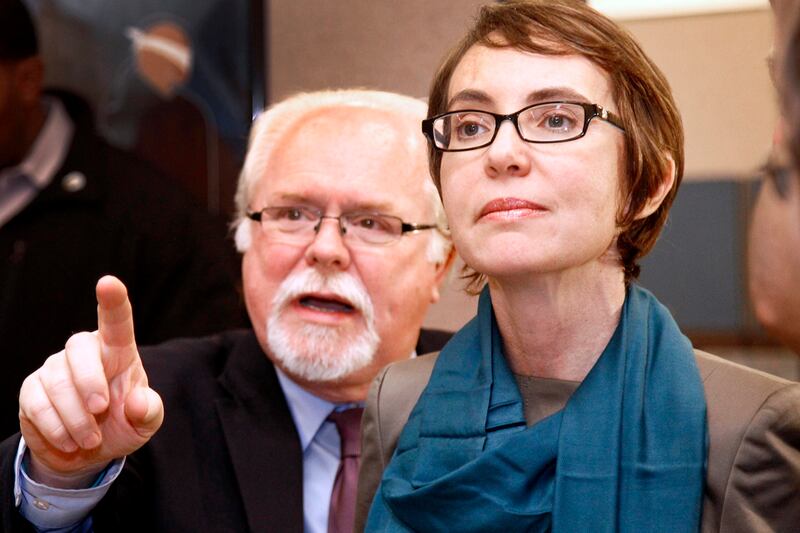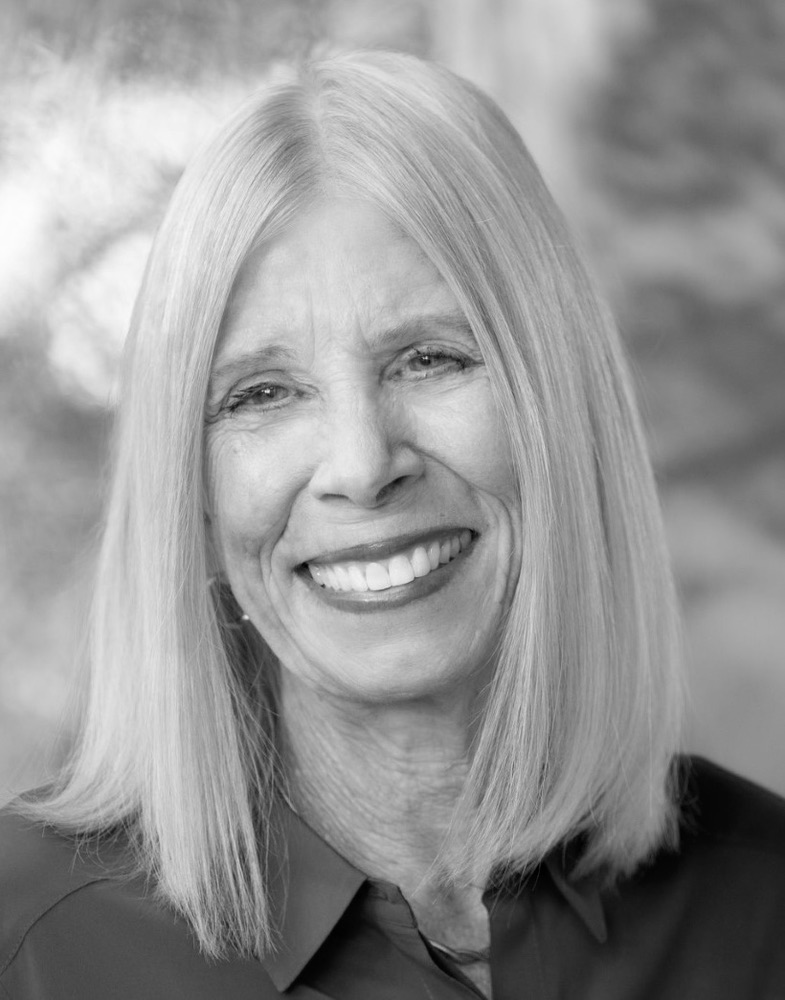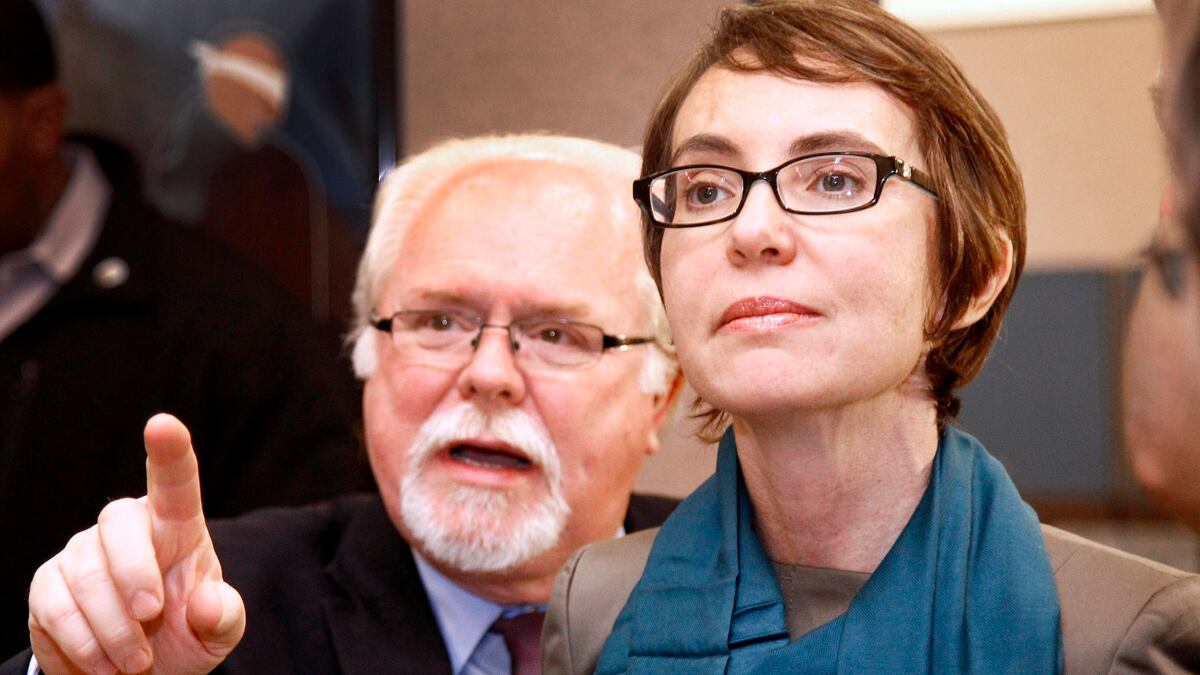In a special Arizona election that garnered widespread national interest for its symbolic significance and potential impact on the presidential race, a 66-year-old Democrat recovering from gunshot wounds defeated a 30-year-old Tea Party Republican and former Marine who had served in Iraq.

Clenching the hand of his grinning former boss, Gabby Giffords, at a Tucson Marriott Hotel victory party, Ron Barber celebrated his defeat of Jesse Kelly in a special election for Giffords’s congressional seat. “This was never Gabby's seat. It’s not my seat. It’s your seat. This seat belongs to the people of southern Arizona,” Barber said in his victory speech in Tucson.
Giffords vacated her House seat in January after struggling for a year to recover from a gunshot wound to the head, sustained in a massacre in front of a Tucson-area Safeway store in January 2011. Six people died in the shooting spree, allegedly perpetrated by a mentally disturbed Tucson man. Ron Barber, who now walks with a cane, was among the 13 people who were injured but survived the rampage. (Giffords cited her ongoing recovery as her reason for resigning her seat.)
Barber’s easy victory was a surprise in Arizona, where politicos expected a tight race. Arizona’s eighth congressional district has 414, 494 registered voters and leans slightly Republican. It spreads from pockets of metropolitan Tucson east to the New Mexico border and south to the Mexican line. It is composed mostly of Anglos, with a disproportionately small number of Latinos.
Giffords had narrowly defeated Barber’s future opponent, Jesse Kelly, in her last election in 2010. At the time, she drew shrill criticism for voting for the Affordable Health Care Act and for disapproving of Arizona’s draconian but popular immigration law, SB 1070. What’s more, Kelly was endorsed by Arizona senators Jon Kyl and John McCain, who called Giffords a spendthrift.
But Giffords became an Arizona icon in the wake of the Tucson shootings, and endorsed Barber, her former staffer, to replace her. Although still in therapy, she appeared at Barber’s Tucson fundraiser last week, and accompanied him Tuesday to cast his vote. (She dropped off her own mail-in ballot at the same time, according to the Arizona Daily Star.) Giffords does not speak to reporters; her astronaut husband, Mark Kelly (no relation to candidate Jesse), speaks on her behalf.
“To be honest, I don’t notice a change in her every single day,” Mark Kelly told a Tucson television station recently. “But I do know, if I think about how she was a month ago, or two months ago, I can see that Gabby continues to improve.”
Democrats were counting on Giffords’s popularity to transfer over some votes for Barber, but Barber had to come up with the political dexterity necessary to earn the additional independent, moderate Republican, and Latino votes that would sway the election.
Giffords’s considerable political talents had been anchored in her drive to understand her politically diverse constituency. She was famous for mastering complicated policy issues relating to constituent problems and for forging consensus. Barber was often at her side. She was well respected in the Republican stronghold of Sierra Vista, for instance, because she advocated for the survival of Fort Huachuca, an Army base that supports the town. And yet she toiled to save the imperiled San Pedro River, one of the last undammed rivers in the southwest, which has struggled to survive the ravages of decades of groundwater-pumping by Fort Huachuca and Sierra Vista. Barber also supports the San Pedro conservation effort.
Although Giffords is a Democrat, conservative southern Arizona cowboys liked her because she voiced support for hawkish border security. Yet she favored comprehensive immigration reform, which included a pathway to legalization for many undocumented immigrants. And she won over Arizona’s bruised Latinos when she opposed Arizona’s controversial immigration law, calling it divisive.
But yesterday’s election was less about local issues and more about the candidates acting as avatars for Mitt Romney and Barack Obama in the presidential election, said longtime Arizona political analyst Mike O’Neil.
Although Barber and Kelly kept their campaigns relatively civil, their surrogates did not. Democrats painted Kelly as a hypocritical Tea Party extremist, and conservatives deemed Barber a rubber stamp for what they called Obama’s ruinous socialist policies.
And while the progressive Public Policy Poll had Barber leading Kelly by 12 points, on the ground in Arizona, both sides predicted the race would be a nail biter.
While the national press “makes this race a bellwether for what will happen in the fall presidential elections,” said Barber’s spokesman, Rodd McLeod, the race was really about the district. Throughout election day, McLeod had been “cautiously optimistic” that his man would win.
And Jason Leon, the national outreach director for Project New America, a progressive political consulting firm, cautioned earlier in the day against framing the Arizona election results as a prognosticator for the national presidential election.
But once Democrats won, they wasted no time saying the race proved that Arizona would go blue. “Ron’s election is a victory for common sense,” said Bill Roe, chairman of the Arizona Democratic Party, in a statement.
Republicans lay their defeat on the Giffords sympathy vote. “We applaud Jesse Kelly for his strong effort to defeat an Obama-aligned candidate but unfortunately, emotional reaction to the terrible crime committed against Congressman [sic] Giffords and her supporters was overwhelming,” said Tom Morrissey, chairman of the Arizona Republican Party, in a statement issued after Kelly conceded.
Shane Wikfors, spokesman for the Arizona Republican Party, dubbed the election a “battle between the head and the heart.”
Millions of campaign dollars poured into Arizona, signaling the election’s national importance—Republicans wanted to keep Wisconsin Gov. Scott Walker’s recall election victory momentum going into the national election. Democrats needed a symbolic victory to kick-start their flagging national momentum and regain ground in a state where Obama has lost ground to Mitt Romney.
According to the Center for Responsive Politics, Barber raked in a bit more money from outside groups. Democratic groups spent about $1.4 million to bolster Barber, while Republicans funneled $1.1 million to Kelly. Individually, Barber “raised just under $1.2 million” compared with Kelly’s $756,000,” the center reported.
Kelly, who in his earlier race against Giffords sought to diminish Social Security and Medicare, was endorsed by the controversial ALIPAC, an immigration PAC associated in news reports with extremism. In his first campaign, Kelly played to gun lovers, posing in camouflage gear and raising money by shooting a machine gun with donors who ponied up $50 each.
In his second campaign, Kelly changed his image to family man and Republican businessman who would grow the economy and kill Obamacare. He posed in ads with his grandfather, vowing to preserve Social Security and Medicare.
But controversy dogged Kelly during his second bid for Congress. The Arizona Republic reported that Kelly, who opposed the Obama administration’s stimulus package, actually benefited from the very program he decried—he worked at a family construction company that reaped millions in stimulus dollars.
And a few days before the election, a Tucson television reporter asked Kelly on camera to explain his ties with the controversial ALIPAC. Kelly said the question was “out of bounds.” And later, in a different conversation with a reporter, he again dodged the question.
Barber will serve six months in Washington before his term expires.
Both Barber and Kelly have said they will run again for Congress. That means both will have to thrash through August primaries. If they win their primary bids, they’ll face off once again in the November election. But recently redrawn district maps will give Democrats a stronger advantage, likely clinching the congressional seat for Barber and Democrats, who hope to take over the House.





